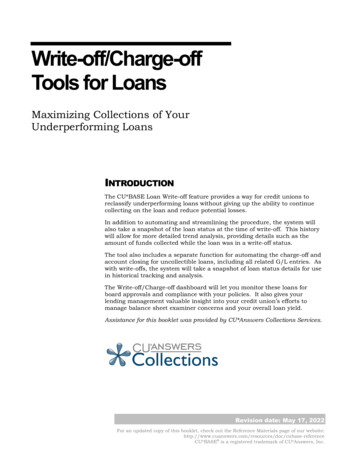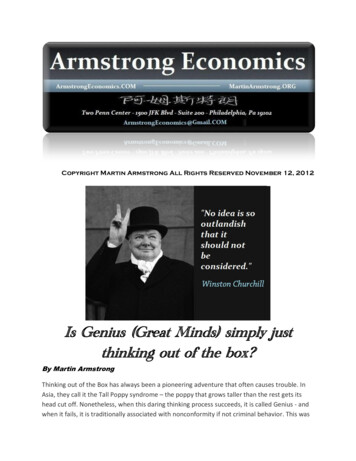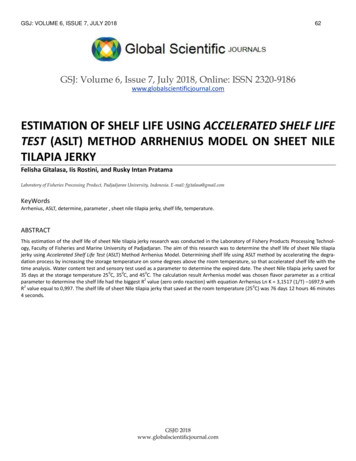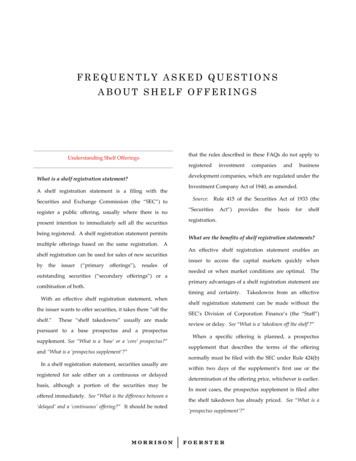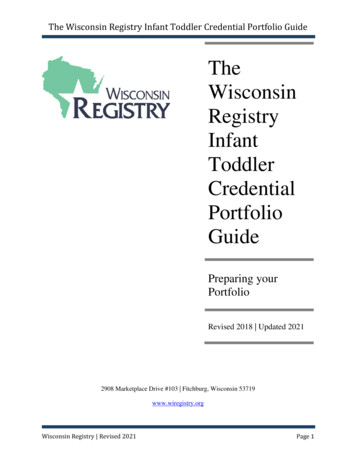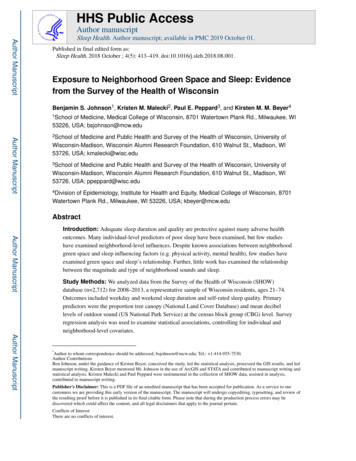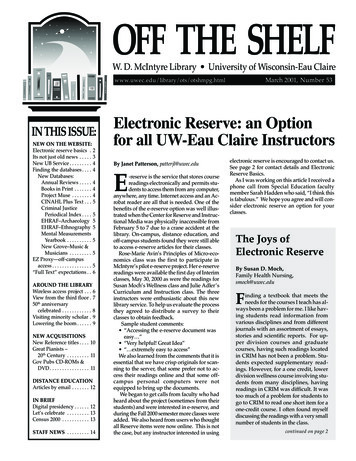
Transcription
OFF THE SHELFW. D. McIntyre Library University of Wisconsin-Eau ClaireMarch 2001, Number 53www.uwec.edu/library/ots/otshmpg.htmlIN THIS ISSUE:NEW ON THE WEBSITE:Electronic reserve basics . 2Its not just old news . . . . . 3New UB Service . . . . . . . . . 4Finding the databases . . . . 4New Databases:Annual Reviews . . . . . 4Books in Print . . . . . . . 4Project Muse . . . . . . . . 4CINAHL Plus Text . . . 5Criminal JusticePeriodical Index . . . . 5EHRAF–Archaeology 5EHRAF–Ethnography 5Mental MeasurementsYearbook . . . . . . . . . . 5New Grove–Music &Musicians . . . . . . . . . 5EZ Proxy—off-campusaccess . . . . . . . . . . . . . . . . 5“Full Text” expectations . . 6AROUND THE LIBRARYWireless access project . . . 6View from the third floor . 750th anniversarycelebrated . . . . . . . . . . . . 8Visiting minority scholar . 9Lowering the boom . . . . . . 9NEW ACQUISITIONSNew Reference titles . . . . 10Great Pianists –20th Century . . . . . . . . . 11Gov Pubs CD-ROMs &DVD . . . . . . . . . . . . . . . . 11DISTANCE EDUCATIONArticles by email . . . . . . . 12IN BRIEFDigital presidency . . . . . . 12Let’s celebrate . . . . . . . . . 13Census 2000 . . . . . . . . . . . 13STAFF NEWS . . . . . . . . . 14Electronic Reserve: an Optionfor all UW-Eau Claire InstructorsBy Janet Patterson, patterjl@uwec.eduE-reserve is the service that stores coursereadings electronically and permits students to access them from any computer,anywhere, any time. Internet access and an Acrobat reader are all that is needed. One of thebenefits of the e-reserve option was well illustrated when the Center for Reserve and Instructional Media was physically inaccessible fromFebruary 5 to 7 due to a crane accident at thelibrary. On-campus, distance education, andoff-campus students found they were still ableto access e-reserve articles for their classes.Rose-Marie Avin’s Principles of Micro-economics class was the first to participate inMcIntyre’s pilot e-reserve project. Her e-reservereadings were available the first day of Interimclasses, May 30, 2000 as were the readings forSusan Moch’s Wellness class and Julie Adler’sCurriculum and Instruction class. The threeinstructors were enthusiastic about this newlibrary service. To help us evaluate the processthey agreed to distribute a survey to theirclasses to obtain feedback.Sample student comments: “Accessing the e-reserve document waseasy ” “Very helpful! Great Idea” “ extremely easy to access”We also learned from the comments that it isessential that we have crisp originals for scanning to the server, that some prefer not to access their readings online and that some offcampus personal computers were notequipped to bring up the documents.We began to get calls from faculty who hadheard about the project (sometimes from theirstudents) and were interested in e-reserve, andduring the Fall 2000 semester more classes wereadded. We also heard from users who thoughtall Reserve items were now online. This is notthe case, but any instructor interested in usingelectronic reserve is encouraged to contact us.See page 2 for contact details and ElectronicReserve Basics.As I was working on this article I received aphone call from Special Education facultymember Sarah Hadden who said, “I think thisis fabulous.” We hope you agree and will consider electronic reserve an option for yourclasses.The Joys ofElectronic ReserveBy Susan D. Moch,Family Health Nursing,smoch@uwec.eduFinding a textbook that meets theneeds for the courses I teach has always been a problem for me. I like having students read information fromvarious disciplines and from differentjournals with an assortment of essays,stories and scientific reports. For upper division courses and graduatecourses, having such readings locatedin CRIM has not been a problem. Students expected supplementary readings. However, for a one credit, lowerdivision wellness course involving students from many disciplines, havingreadings in CRIM was difficult. It wastoo much of a problem for students togo to CRIM to read one short item for aone-credit course. I often found myselfdiscussing the readings with a very smallnumber of students in the class.continued on page 2
NEW ON THE WEBSITEMedia for the appropriate forms andguidelines. The instructor completesand signs the “Electronic ReserveForm” which includes a list of theindividual items and their bibliographic citations, an accurate countof the students who will use thereadings, and a clean copy of thereadings. When the forms arereceived in CRIM, the materials will be processed.ElectronicReserveBasicsby Janet Patterson,patterjl@uwec.eduWhat is e-reserve?Chapters and articles for a particular courseare electronically stored and accessed.What are the benefits of using e-reserve?Students can access Reserve readings at anytime of the day or night from any computerwith Internet access and an Acrobat reader.How does e-reserve work?A clean copy of the original article isscanned, creating a .pdf file that is placedon a server. This file is linked to the library’sVoyager computer system so that the itemmay be found by searching the Course/Reserve option in the online library catalog.What may be submitted for e-reserve? syllabi, lecture notes, tests or other material created by the faculty member student papers if the faculty memberhas obtained permission from the studentJoy continued from page 1Then came the joy of electronic reserve.Through electronic reserve, students canaccess the reserve articles from a computer away from the library. They followsimple instructions provided by JanetPatterson to access the reserve files. I justattach the electronic reserve directions tomy course syllabus so students have easyaccess to directions.Because of electronic reserve, I nowhave discussions with a larger numberof students in the one-credit wellnessclasses I teach. I’m sorry to report thatelectronic reserve did not magically make2 one article per periodical issue (moremay be permitted if the total excerptedis an appropriate portion of the issueand/or the issue is in the library collection) a single chapter from a book (on occasion more might be possible if the total excerpted is an appropriate portionof the book and/or the book is in thelibrary collection)How may these be submitted? A very clean, legible copy of an articlefrom a periodical or a chapter from abook MS Word documents on disk, electronic files (such as text files), or AdobeAcrobat pdf files, standard image filesHow does an instructor place course readings on e-reserve?The first step is to contact Janet Pattersonin the Center for Reserve and Instructionaleveryone in the class complete the readings, but it certainly has helped.Students like electronic reserve. Theyreport that they often continue to makeprint copies of the articles, but that theycan get access to the materials and readthem online before class if they are inclined to do so. On occasion, a studentsends me a note that he/she could not getthe materials. When I get the note and donot have a suggestion, I refer the studentto the computer help desk. The studentusually finds the answer to the problem.I can easily sing the joys of electronicreserve. So, if you want a little more joyin your life, I recommend electronic reserve.How long does it take to get areading on e-reserve?The length of time varies. Atpresent we ask that a minimum ofone week be allowed, up to threeweeks would be appreciated.How do you access these readings?Access is available through the library’shome page from any campus or home PCthat has an Acrobat reader installed andthat has an internet connection. From offcampus, use the Course Reserve link ratherthan the Off-campus access link. Course Reserves are password protected. A detailedaccess guide is available in the library oronline at www.uwec.edu/library/Guides/reserve.htmlHow does a non-UW-Eau Claire studentin a UW-Eau Claire Distance Educationclass gain access to the course e-reserveitems?Instructors will have a Username and Password that may be used by the DE studentsin their class. Contact Jill Markgraf for information.What if the server or the library computeris down or not available or the studentprefers a print copy?A print copy of the reading is placed onregular Reserve in CRIM, and may be obtained by presenting the call number of thearticle and their Blugold card at the CRIMpublic service desk.Contacts:For electronic reserve information:Janet Patterson - CRIMpatterjl@uwec.edu(715) 836-4362For Distance Education assistance:Jill Markgraf - Referencemarkgrjs@uwec.edu(715) 836-5357OFF THE SHELF March 2001
NEW ON THE WEBSITEIt’s not justOld News anymore:The Scoop on Web Newspapersby Betsy Richmond, richmoeb@uwec.eduIt may be old news that newspapers areon the web, but the way to get to thenews may be news to you!Questions to guide you in choosing anonline newspaper:1. Do you want the current edition or apast edition?2. Are you looking for a job in Eau Claireor Tucson, Arizona?3. Do you want a 1945 article?4. Do you want news from the Midwest(U. S.)?5. Do you want news from the MiddleEast (Global)?6. Do you want a Dutch language newspaper?Each of these questions may be answeredby a variety of sources, often free, sometimesfor a fee.THE OPTIONS FORLOCATING THE NEWSSome of these options are:1. Individual newspaper websitesMany newspapers have free web sitesfor the current edition, but usually requirea paid subscription for archival (old)news. Some subscriptions, such as to theNew York Times, are free of charge, but thecoverage of the paper is not as comprehensive as the print. (This relates toquestion 1 above.)For example, the current issue and the previous week of the Eau Claire Leader Telegram isavailable from the library web page: ReferenceResources, Online Reference Shelf, Mass Media or directly at www.leadertelegram.com.Like most local newspaper websites, itfeatures front page, local and state news,sports, features, business, opinions, entertainment, police, obituaries, archives, moments in life, special reports, and classifieds.(This partially answers question 2, findinga job in Eau Claire.)Access to Leader Telegram news older thanone week is available online through sub-OFF THE SHELF March 2001scription from the publisher or on microfilm in McIntyre Library.Many other individual newspapers havewebsites. To determine their URLs, see below.2. Metasite links to websitesAJR NewsLink, the American JournalismReview, links to online newspapersworldwide. AJR ‘s categories offer:national newspapers by state, mostlinked-to national newspapers, majormetros, dailies, business, alternative andspecialty.AJR NewsLink is a good choice for job information in another city, and will answerthe question about current jobs in Tucson,question 2, above. The news here is current,not retrospective without a personal subscription, and the search tools for the individual newspapers will vary in quality andformat.Access is through the Library web page:Reference Resources, Online ReferenceShelf, Mass Media.3. McIntyre Library web page: access tonewspaper indexes and full-text databasesMcIntyre Library subscriptions to newspaper databases provide access to over 500newspaper full-text sources. From the Library web page, choose Research Resources, Article Indexes & Databases, Subject List, Newspapers & Current Affairs.These indexes and databases lead to citations, abstracts, and often full-text articles.CHARACTERISTICS OFNEWSPAPER DATABASESNewspaper databases, like many otherdatabases, vary in coverage and scope.1. CoverageNewspaper databases may cover foreign,national, state, or regional newspapers. Thecoverage may include “mainstream” dailynewspapers, business, and alternative orspecialty papers.Databases may index all content of newspaper titles. Some articles will be full-text,others will not. Databases vary in whicharticles in the publication they include. Inthis context, a full-text product indicates anewspaper file that comes directly from thepaper’s publisher and includes all articles.An example is Academic Universe availablethrough the Library.Collection coverage databases are notmeant to be comprehensive and cover allarticles in a newspaper, but extract relevantarticles on selected themes, such as business or international issues. Examples include ProQuest Newspapers, Global Newsbankand Ethnic Newswatch. Some, but not all, articles in these databases are full-text.2. Time periodBeginning dates of coverage are not consistent for the many newspapers in databases such as Academic Search, AcademicUniverse, and Proquest Newspapers. Someonline newspaper content begins with 1980articles, but in other cases coverage may notextend back beyond 1999. Still other papers,nominally included in the database, mayappear for several years and then be discontinued or in hiatus. Usually coverage information is available in the product’s“Help”. Older newspaper articles can befound using print indexes. (Answer toquestion 3 above.)McIntyre Library has print indexes to theNew York Times, London Times, Wall StreetJournal, and Christian Science Monitor.3. Newspaper searching hintsSome newspaper databases containsearchable sub-files. Academic Universe filescan be searched by region of the U.S., region of the world, or by language (See questions 4, 5 and 6 above.) Other databaseshave similar features.Newspaper articles may appear in several indexes. New York Times articles are indexed in Academic Universe, Academic Searchand ProQuest Newspapers, but not all databases have licensing rights to keep full-textarticles online for longer than 90 days.Final WordsIf you’re thinking caveat emptor, you’re right.Keep in mind WHAT you’re searchingfor and WHAT you’re likely to findWHERE. And, of course, be happy for theincreased access to all these full-text newspaper resources, courtesy of and . @ yourlibrary!3
NEW ON THE WEBSITENew Library Service:Borrow Materialsfrom anyUW Library!by Stephen Elfstrand,elfstrsf@uwec.eduOne System – One Library, is theconcept behind a new initiativethat UW libraries are undertaking. Library users will be able to borrowlibrary materials from any UW library andhave them delivered quickly to any otherUW library. This program, called Universal Borrowing (UB for short), will havemany advantages for you, the library user.Using UB you will be able to identify materials of interest to you by searching several library catalogs at once. Once identified, you can see in real time whether a titleis checked out. If not, a convenient onlineform will immediately send your requestto the holding library. There a call slip willbe created, the item will be pulled andplaced on a truck for delivery to this library.UW system libraries have 5-day per weekcourier service so the user can expect to seethe book quickly. When it reaches the destination library, a notice will go out to theborrower, showing that it is ready forpickup. In addition, throughout this process the status of the item will be availableto you through the online catalog. Whenyou come in to the library, you will be ableto check it out using your library card.UW libraries have agreed to a common28-day loan period and have pledged tomake all materials that circulate on theirown campuses available to UB patronsthroughout the UW System. This is anotherexample of how UW libraries are workingtogether in innovative ways to provide better information services to you.Three UW libraries, Eau Claire, Stout andLa Crosse, are working with the library system vendor to beta test this product during spring semester. In February, the libraries began testing UB with test records andpatrons. Watch for an announcement inviting you to participate in testing this newservice. Full implementation of UniversalBorrowing in all UW Libraries is plannedduring Fall Semester 2001.4Finding the DatabasesThe simplest way to access most ofthe resources mentioned on thesepages is to look them up by title fromthe library homepage Master Indexat: www.uwec.edu/libraryThey are also linked in the alphabetical list of databases, (libraryhomepage/Research Resources/Article Indexes & Databases/Alphabetical List), as well as under theSubject List.New andUpdated Databasesby Linda Cecchini,cecchilr@uwec.eduNewAnnual Reviews, according to its publishers, provides “the worldwide scientificcommunity with a useful and intelligentsynthesis of the primary research literature for a broad spectrum of scientific disciplines. Annual Reviews publications areamong the most highly cited in scientificliterature. All Annual Reviews series areranked within the top ten publications fortheir respective disciplines.” From anthropology to medicine, astronomy tophysiology, Annual Reviews lead scholarsto the principal contributions in twentynine different fields. Browse each individually, or do a keyword or a peoplesearch across the entire collection. The library already owns a print edition formany of the categories, but the publishernow supplies us both online and print fora single price. The electronic version facilitates rapid browsing and searching.Books in Print—Enhanced InterfaceWe have changed our vendor for Booksin Print from EbscoHost to Bowker. Besides bibliographic information and reviews from standard industry sourcessuch as Library Journal and PublishersWeekly, Bowker BIP contains separate“Rooms” highlighting forthcomingbooks, children’s books, and fiction.One can search for books and videos,not only by title, but also by generalsubject terms. There are links to publishers’ home pages, author biographies, and lists of bestsellers and literary awards titles. It’s not just for librarians! Bibliophiles will want to explorethis site, too.And just a reminder: Bowker ’sUlrichsweb, acquired last year, containsmany of the same features for periodicals as BIP does for books and videos.Check it out.Project Muse Continues to GrowSince 1998 the UW System fund forshared library resources has paid the access fees to Project Muse, a collection ofcurrent journals in the humanities, social sciences, and mathematics. Duringthe course of 2001 Muse will increaseits holdings, bringing the total numberof titles to 167. McIntyre Library alreadyowns some of these journals in print ormicroform. However, many were neveron our shelves. Users will find links tothe online versions from individual bibliographic records in our library catalog or from the Project Muse home page.For a complete list of journals availablepoint your browser to muse.jhu.edu/journals/Here are just a few examples of ProjectMuse titles new to UW-Eau Claire:American Literary HistoryBuddhist-Christian StudiesChina Review InternationalCinema JournalGLQ: a Journal of Lesbian and GayStudiesJournal of Medieval and EarlyModern StudiesJournal of Speculative PhilosophyJournal of World HistoryLinguistic TheoryMediterranean QuarterlyPerspectives in Biology and MedicinePortal: Libraries and the AcademyPhilosophy and RhetoricPoetics TodayPositions: East Asia Cultures CritiquePublic CultureSocial Science HistorySocial TextOFF THE SHELF March 2001
NEW ON THE WEBSITENew Databasesby Mimi King, kingm@uwec.eduEach semester we are able to offermore online versions of disciplinestandards. This time we have expanded the Arts, Humanities, Nursing and Social Sciences databases.Short guides to these databases areavailable or in process; ask at the Reference Desk.ology. The collection is indexed by culture (in Outline of World Cultures andthe Outline of Cultural Materials) andsubject.EZ Proxy —Off CampusAccess MadeEasyby Jill Markgraf, markgrjs@uwec.eduCINAHL PlusTextProvides access to English languagenursing journals, publications of theAmerican Nurses’ Association, the National League for Nursing, and primary journals in more than a dozenallied health disciplines. Also includesselected citations from Index Medicus,from journals in the fields of health sciences librarianship, education, behavioral sciences, management, and frompopular magazines. Approximately250 journals are available in full text inthis version of the database.Criminal Justice Periodical Index(1975-)Indexes by subject and author over 150trade and scholarly periodicals incriminal justice and related fields. Itcovers U.S., British and Canadian journals, including 51 full-text titles. Topics covered: corrections; criminal law;criminology; drug abuse; family law;juvenile justice; police studies; prisonadministration; rehabilitation; and security systems. Many of the full textjournals are from Commonwealthcountries.eHRAF Collection of ArchaeologyeHRAF Archaeology contains full-textinformation (e.g., books, journal articles, and dissertations) about archaeological traditions. eHRAF Archaeology isunique in that the text is subject-indexed for quick retrieval of information. Every year more archaeologicaltraditions are added to eHRAF Archae-OFF THE SHELF March 2001eHRAF Collection of EthnographyeHRAF Ethnography is a cross-culturaldatabase that provides descriptive information on the cultures of the world.eHRAF Ethnography is unique in thateach section of the text is indexed. Every year more cultures are added toeHRAF.Mental Measurements YearbookProduced by the Buros Institute, MMYcontains full text information aboutand reviews of all commercially available English-language standardizedtests. As in the print version, MentalMeasurements Yearbooks, it covers educational skills, personality, vocationalaptitude, psychology, and related areas.If you accessed web-based librarydatabases from off campus in the past,chances are you had to go through thecumbersome steps of configuring yourWeb browser to use what’s called a proxyserver. That’s no longer necessary! The Library has installed a new remote accessservice (aptly named EZProxy) which requires no setup or configuring by the user.Rather, you simply click on a database linkand enter your UW-Eau Claire usernameand NT password (or PIN) in the dialogbox. Please make sure your browser is nolonger configured to use the old proxyserver as it will interfere with the newEZProxy. For more information on usingthe new remote access service and on disabling the old proxy server, please seew w w. u w e c . e d u / l i b r a r y / G u i d e s /proxy.htmlNew Grove Dictionary of Music &MusiciansThis second edition (first online) provides access to 29,499 articles, 5,623more than the first edition. This resource covers all aspects of music andperformance and includes links to external sites providing digital soundclips to amplify understanding of thearticles. Topics covered: music—ancient, church, world, popular, light,and jazz; styles, terms and genres: instruments—makers, performance andpractice; musical concepts; acoustics;notation; printing & publishing; theater directors; and biographies of composers, performers and writers onmusic. Coverage: current—updatedannually.5
NEW ON THE WEBSITEAROUND THE LIBRARY“Full Text”and RisingExpectationsby Dan Norstedt, norsteda@uwec.eduElectronic full text is partially here. Expectations of complete full text are rising, and librarians both encouragethe trend and attempt to keep a lid on unrealistic expectations.The picture is mixed in the area of most activity, periodicaldatabases. Vendors are more impressed than librarians, and itis not uncommon that a database containing 20% full text islabeled, for example, “World Affairs Full Text.” The generalpurpose EBSCO Academic Search Elite has, by my sampling,about 65% full text, and because of the high probability of obtaining full text articles and also the broad subject coverage ofAcademic Search Elite, this database has become the first choiceof most undergraduates. Business periodical databases such asABI-Inform and Business Reference Suite have the largest percentage of full text articles. There is certainly a temptation to takethe articles that are full text and begin preparing the paper, butwe do our best to promote a comprehensive look at article citations, which may lead students beyond the printer to the second floor periodical collection or to the interlibrary loan forms.Less endowed with full text but gaining ground are the Wilson databases, long the standard-bearers of this library. Thesedatabases include the old Social Sciences Index, Humanities Index, Business Index, and several others. The label “Index” waschanged first to “Abstracts” and more recently to “Full Text.”On the far side of the continuum are indexes and abstractsthat have virtually no full text. Included in this group are MLABibliography, America: History and Life, Historical Abstracts, Web ofScience, PsycINFO, Medline, CINAHL, and EconLIT. One day Iwas called to a computer workstation by a student who hadretrieved a citation from CINAHL. He said “this is what I want,just tell me where to click to get it [the full text]! It took a longtime to convince the person that “it” was not right there, and adifferent path was needed to obtain the full text, either electronic or in print.The library through its UW-System consortium has subscribedto several complete full text services established by publishers,such as American Chemical Society Journals, Academic PressJournals, and JSTOR. These collections can be searched directly,but their main purpose is to provide articles that have been citedin traditional bibliographic databases. Our automation department is working hard to link database citations to either sourcesof full text, our own print collection, or the interlibrary loanservice.6LibraryParticipatesin a CNS WirelessPilot ProjectBy Mimi King, kingm@uwec.eduAh, the dream of college life: loungingin the sun on the lawn, soaking up knowledge! Well, we’re getting closer Beginning this semester, Computing & Networking Services has initiated a study of wireless access to thecampus network. Currently wireless access is available inthree general locations: the first three floors of the Library,the eastern end of the Old Library and the campus mall.As with cell phone reception, coverage of these areas isnot complete—there are “dead spots” where such obstaclesas the bookshelves block the signal.The connection speed is slower than standard Ethernetaccess and multiple users in one location could make iteven slower. However, wireless technology allows mobility and cost-effective access to the campus network wherestandard Ethernet is not feasible. CNS is hoping this projectwill help them assess the scope and limitations of the wireless antennae. If this phase of the project is successful, access may be expanded to cover all of the Old Library,Davies Center, and possibly, Zorn Arena and McPhee.If you would like to try it, you can borrow a laptop fromMedia Development Center (ask for the “wireless card”).Your students can get laptops with wireless access cardsat the general access lab (OL1108). Note: Mac computersare not compatible with the current wireless equipmentand software.OFF THE SHELF March 2001
AROUND THE LIBRARY:VIEW FROM THE THIRD FLOORHelping to Shape the Future ofScholarly Communicationby Bob Rose, roserf@uwec.edusity Presses, and the National Associationof State Universities & Land Grant Colleges.The first example of this new mode ofy now, everyone is thoroughly fadoing business was the launch of Evolutionmiliar with the incredible price inary Ecology Research. Its predecessor begancreases of many scholarly journalsin 1986 with an initial subscription price ofand the profound effect those increases 100 for libraries. By 1998, that journal’shave had on library budgets and collecownership had changed twice and the pricetions. Libraries have been spending morehad escalated to 800. At that point theand more money on fewer and fewer jourjournal’s editorial board decided to resignnals over the past years. While the generalen masse and create the new journal that,inflation rate has hovered in the low singleby the way, currently costs 305 for librardigits for some time, the inflation rate fories for both print and electronic access – andscholarly journals has been averaging aboutless for electronic access only. Others adopt10% for a number of years.ing this new mode include Algebraic andI think it encouraging . that scholars are Geometric Topology,beginning to take matters into their own hands Organic Letters, andGeochemical Transacto provide reasonably priced alternatives to tions. More information about SPARCshare the results of their research.can be found atwww.arl.org/sparc.The “Create Change” campaign hopesDespite the efforts made by librarians“to make faculty and administrators awareand scholars to halt this trend, little hasof the most important aspects of the serialsproved effective. We are now beginning toissue, to introduce faculty to specific wayssee the seeds of change as scholars attemptin which they can foster change, and to supto take back control of the scholarly comport and encourage potential faculty leadmunication process from large, multinaers in this area.” Through the campaign,tional corporations. A major effort has beenindividual faculty members can evaluatelaunched under the auspices of SPARC (thewhether they want to resign from the ediScholarly Publishing and Academic Retorial boards of expensive, commercial joursources Coalition), ARL (the Association ofnals and whether to serve as peer reviewResearch Libraries), and ACRL (the Assoers for such journals. The campaign willciation of College and Research Libraries),provide models and templates to facultyto create change in the scholarly communiwho wish to modify copyright transfercation process. Those groups have in factagreements to allow them to retain rightsdeveloped a “Create Change” campaign toto their publications. Editorial boards willdo just that.be provided the resources to help them toSPARC is fostering partnerships to credetermine whether to stay with their curate a more competitive scholarly commurent commercial publisher or to move tonication marketplace where costs are renonprofit or independent publishing venduced and publishers are rewarded for reues.sp
public service desk. Contacts: For electronic reserve information: Janet Patterson - CRIM patterjl@uwec.edu (715) 836-4362 For Distance Education assistance: Jill Markgraf - Reference markgrjs@uwec.edu (715) 836-5357 Then came the joy of electronic reserve. Through electronic reserve, students can access the reserve articles from a com-


